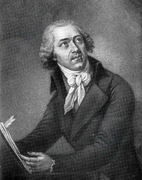The 200th Anniversary of Leopold Koželuh's Death
Monday, May 7, 2018

The Bohemian composer Leopold Koželuh (1747-1818) was baptized with the names Jan Antonín, but to avoid confusion with his cousin of the same name, he added Leopold by 1774. Leopold learned composition from Jan Antonín (the cousin) and piano from František Xaver Dušek. After initial success as a composer in Prague, Leopold moved to Vienna to work as a pianist and composer. Soon he came to be seen as competition to Wolfgang Amadeus Mozart and he succeeded in gaining a foothold as a piano teacher in the highest aristocratic circles. In 1785, Koželuh founded a music publishing house and opened a music shop. He wrote a coronation cantata for Emperor Leopold II when he was crowned King of Bohemia in 1791. After the piece was performed, Koželuh was named “Kammer Kapellmeister” and “Hofmusik Compositor,” a position that was associated with composing stage works. An illness significantly reduced the number of his compositions starting in 1802. His works practically disappeared from Viennese concert life.
Koželuh left behind 400 works. A catalog of works by Milan Poštolka (Leopold Koželuh, Život a dílo, Prague: Statni hudedni vydavatelstvi, 1964; cited in RISM as PosK) lists 30 symphonies, 22 piano concertos, 2 clarinet concertos, a trumpet concerto, 24 sonatas for piano and violin, 63 piano trios, 2 oratorios, 9 cantatas, and some sacred works. His oeuvre also includes six operas and ballets each, which are all considered missing–except for one opera.
This past March, Koželuh’s sole surviving opera Gustav Vasa was performed in Helsinki. The manuscript was located in the library of the Prague Conservatoire (CZ-Pk) and the opera was presented for the first time since the death of the composer as part of the Helsinki Baroque Orchestra’s Early Music Series.
The three-act opera Gustav Vasa “explores the important event in the history of the Swedish nation: the battle between Sweden and Denmark in the beginning of the 16th century. Through creative video design, the ultra-modern concert hall of the Helsinki Music Centre will be transformed to a medieval battlefield” (Helsinki Baroque Orchestra).
Gustav Vasa (1496-1560) freed Sweden from the rule of the King Christian of Denmark. Two strong women, Gustav Vasa’s mother Cecilia and his sister Margareta, also play an important role in the opera and determine the course of events. The performance from 10 March 2018 can be viewed online (the music starts at 8:38).
Image: Portrait of Leopold Koželuh by W. Ridley, from Wikimedia Commons.
Share Tweet EmailCategory: Musical anniversaries

